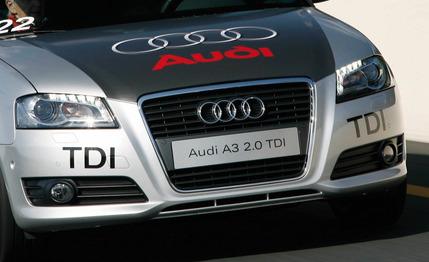 First Drive Review
First Drive Review
Even though many of them are now working on hybrids, European automakers’ response to gasoline-electric vehicles—long championed by Japanese companies—has been to first scoff and then to point to their robust lineups of fuel-efficient diesel powertrains. Of course, diesels represent about 50 percent of the market in Europe, but they have never been offered widely in America. Fluctuating fuel prices are slowly beginning to change that, and although Euro diesels recently launched in the States have been installed in sedans and SUVs, small oil burners make sense, too. After all, if a premium sedan with the economy of a compact is impressive, let’s see what happens when you drop a diesel into a compact.
Mmm . . . Compression Ignition
The ritzy A3 compact hatchback, based on the VW Golf/Rabbit but with a much more upscale look and interior, has long been available with diesel engines in Europe. Now Ingolstadt is pondering offering such a combo in the U.S., too. The vanguard: two A3 TDIs that served as part of the Audi Mileage Marathon, a long haul from New York to Los Angeles that gave scribes a chance to examine diesel economy in real-world conditions on American roads. (The U.S.-bound Q7 3.0 TDI was the featured vehicle of the event.)
The 2.0-liter direct-injection turbo-diesel found under the hood of the A3 we drove was significantly reengineered and upgraded earlier this year. It’s essentially the same unit used in the 50-state-compliant Volkswagen Jetta TDI, and here it makes the same 140 horsepower and 236 pound-feet of torque. In the process of the upgrade, Audi switched from the previously used pump injectors, one for each cylinder, to common-rail fuel injection, in which fuel travels through a single high-pressure rail. The common-rail system allows several injections per cylinder stroke, making it easier to meet emissions targets, and it has the added benefit of being quieter.
The shift to common-rail technology is clearly felt. Whereas the old diesel engine virtually jerked the A3 forward, the new engine is more linear in response. Power delivery is more smooth, and there is noticeably less noise and harshness. On the other hand, a bit of the "kick" is missing; the old engine was crude, but it did feel quicker. This latest A3 diesel takes 8.9 seconds to cover 0 to 62 mph, according to Audi; for comparison, an A3 with the 2.0-liter turbo gasoline-fueled four requires about seven seconds to reach 62 mph, and we recorded 8.1 seconds to 60 mph in the Jetta TDI. A more-powerful 170-horse version of the 2.0-liter diesel is available in Europe as well, and it returns performance closer to that of its gas counterpart.